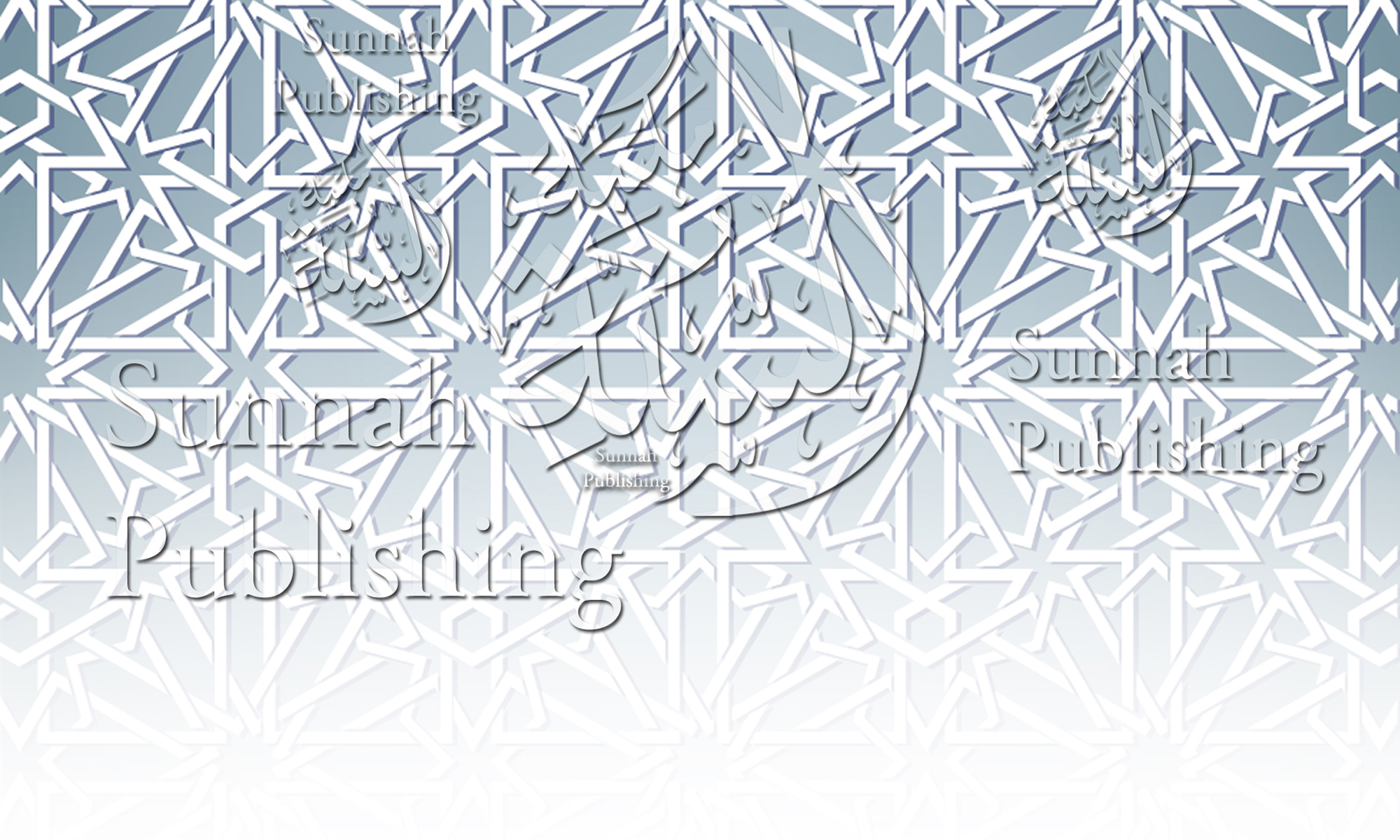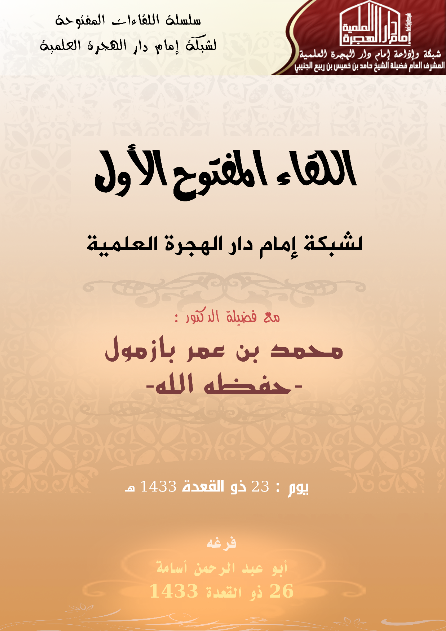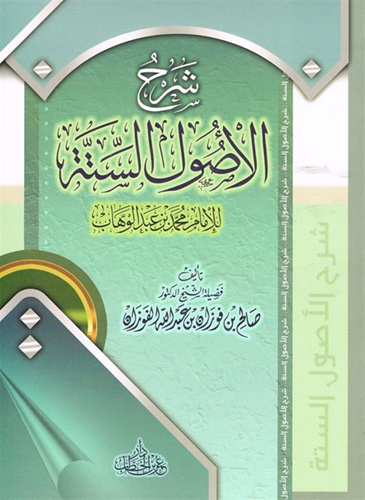[Q]: Our noble Shaykh, why have you chosen the manhaj of al-Jarh wat-Ta’deel as a path, even though in the view of many of the callers (du’aat) and reformers, it is considered a cause for discord within the Ummah and a way to hatred for those who travel upon this path. They use as an argument the claim that al-Jarh wat-Ta’deel has already ended along with the time of hadeeth narration.
[A]: I have not chosen the manhaj of al-Jarh wat-Ta’deel. I am only a critic (naaqid). I saw many innovations and calamities and misguidance had attached themselves to Islaam. So I took great pains, within the limits of my strength, along with my incapability and my weakness, to expel this falsehood, which had attached itself to the Religion out of oppression and falsehood, from Islaam. So the innovations, misguidance and deviation occurred from callers who ascribed to Islaam, not to mention that this was in the age of extremism and flattery. Meaning, these affairs had attached themselves to Islaam and had become attributed to Islaam. So I worked to expel this falsehood from Islaam.
Regardless of whether it is called jarh (disparagement, criticism) or ta’deel (praise), or whatever it is called, I only criticize false speech. And I clarify its opposition to Islaam – may Allaah bless you – with proofs and evidence. I clarify how this speech opposes the beliefs (’aqaa‘id) and how it opposes the manhaj of Islaam. I clarify these issues that are considered fiqh (understanding) in the topic of al-’aqeedah (creed) and manhaj (methodology), may Allaah bless you. Some of the people have named that jarh and ta’deel. Of course something of al-Jarh wat-Ta’deel has entered by way of this criticism (naqd).
So I do not call myself a mujarrih (one who disparages) and a mu’addil (one who praises), I only call myself a weak and indigent naaqid (critic). And I have not gotten into the middle of this criticism, may Allaah bless you, except because the people have moved onto other aspects of Islaam in order to aid Islaam. And this was made easy and all of that is from the affairs that aid Islaam and lead to the raising of its banner and they make the word of Allaah the Blessed and Exalted uppermost. This one gives attention to the topic of criticism and that one gives attention to the authentication of ahaadeeth, and no one blames each other.
This is from the communal obligations (fard kifaayah). When some of the people carry out this obligation, then the burden of it is lifted from the rest. So this individual carries out the obligation of this aspect – the communal obligation – and that individual carries out the communal obligation of that aspect. So this one writes about ’aqeedah (creed) and this one writes about the Sunnah, he authenticates and he declares ahaadeeth weak and he extracts fiqh rulings. So the end result is that all of them complete and supplement each other.
And the statement that the Tableegh and the Ikhwaan and the other groups complete each other is an error and a blunder. It is an error that occurred from someone who is attributed to the Salafee manhaj and it is from the errors of the people of desires and misguidance. So the innovation can never complete Islaam. [1]
So when this individual has drafted himself to raise the banner of innovation and to aid it and to call to it, and another one has done the same, and yet another one has done the same, then we do not hold that this will do anything but contribute to the destruction of Islaam. And it will not complete anything from Islaam at all. It will only bring about defect and deformity. [2]
And his statement, “The age of al-Jarh wat-Ta’deel has ended,” this is a lie. The manhaj of criticism (naqd) will not end up until the Day of Judgement. And the manhaj of the Jarh wat-Ta’deel will not end until the Day of Judgement. As long as innovations and slogans of misguidance exist and they have callers and imaams of misguidance, then al-Jarh wat-Ta’deel will not end up until the Day of Judgement. And it is surely from Jihaad. [3] Rather, it is better than striking with swords. [4]
And the age of narration ended in the third generation. So why did Ibn Taymiyyah (d.728H) raise the banner of criticism (naqd) and the banner of al-Jarh wat-Ta’deel?! Likewise, there were adh-Dhahabee (d.748H) and Ibnul-Qayyim (d.751H) and Ibn Katheer (d.774H) and Ibn Hajr (d.852H) and others up until the Day of Judgement.
As long as there is a struggle between truth and falsehood and between guidance and misguidance and between the people of truth and the falsehood and between the people of guidance and the misguidance, then it is inevitable that the swords of criticism (naqd) and al-Jarh wat-Ta’deel remain unsheathed against the people of falsehood. And they are more dangerous than the people of narration and have more reason to receive jarh than the narrators who could err legally and logically.
However, these are individuals who invent innovations and spread them deliberately amongst the ranks of the Muslims in the name of Islaam.
And as for the narrators, then the liars from amongst them were few and confined and the rest of the people were good and made errors. So the other were not silent about them.
So even though the age of narration has already ended, the age of criticism has not ended – criticism of the people of innovation and disparagement (jarh) of them and clarifying their misguidance and their danger. This shall remain continuous up until the Day of Judgement, and it is Jihaad. [5]
Endnotes:
[1]: One such example is ’Abdur-Rahmaan ’Abdul-Khaaliq who said in al-Wasaayaa al-’Ashar lil-’Aamileen bid-Da’wah (p. 72), “And the conclusion is that I call to mutual closeness and organization between the Islaamic groups (jamaa’aat). And I call to opening up avenues for discussion and meeting and mutual competition in goodness and being mutually close in doing good works. And this is what will hasten the spreading of religious sentiment what will transform our societies into Islaamic societies.”
Compare this to what the major Scholars of our times have said: Imaam Muhammad Ibn Saalih al-’Uthaymeen (d.1421H) said, “I say: There is not either in the Book or the Sunnah that which allows multiple groups and parties. Rather, there is in the Book and the Sunnah that which censures this. Allaah the Exalted said,
“Verily those who split up their Religion and become sects, you have no concern with them in the least. Their affair is with Allaah who will tell them about what they used to do.” [Sooratul-An’aam 6:159].” Refer to the cassette tape, Majmoo’ Kalaamul-’Ulamaa fee ’Abdur-Rahmaan ’Abdul-Khaaliq (side two).
Imaam Muhammad Naasirud-Deen al-Albaanee (d.1420H) said, “Therefore, we believe with certainty, that every group that does not establish itself upon the foundation of the Book and the Sunnah and the manhaj of the Salafus-Saalih – having extensively and comprehensively studied the rulings of Islaam, the large and the small, the principles and the branches – then this group will not be from the Saved-Sect; the Sect which proceeds upon the Straight Path which was indicated by the Messenger (sallallaahu ’alayhi wa sallam) in the authentic hadeeth.” Refer to Fataawaa Shaykh al-Albaanee (p. 106-114). [TN]
[2]: Imaam al-Barbahaaree (d.329H) said, “And know that a people do not innovate an innovation, except that they abandon its like from the Sunnah.” Refer to Sharhus-Sunnah (no. 6).
And Hassaan Ibn ’Atiyyah said, “Indeed, the people do not innovate an innovation, except that Allaah removes from them its like from the Sunnah. It does not return to them until the Day of Judgement.” Refer to Saheehul-Mishkaat (no. 188) of al-Albaanee.
And al-Fudayl Ibn ’Iyaad (d.187H) said, “And whosoever gives importance to an innovator, then he has aided him in the destruction of Islaam.” Refer to Sharhus-Sunnah (p. 252) of al-Barbahaaree.
[3]: Imaam ’Abdur-Rahmaan Ibn Naasir as-Sa’dee (d.1376H) – rahimahullaah – said, “The Jihaad is of two types: a Jihaad by which the rectification of the Muslims is intended, and their correctness in their beliefs and their manners, and all of their religious and worldly affairs, and in their knowledge and action related education. And this type is the basis of Jihaad and its foundation, and built upon it is the second type of Jihaad. It is the Jihaad by which the defense against the transgressors upon Islaam is intended, such as the disbelievers, and the hypocrites, and the atheists and all of the enemies of the Religion and their supporters.” Refer to Wujoobut-Ta’aawun baynal-Muslimeen (p. 7-8) of as-Sa’dee. [TN]
[4]: Shaykhul-Islaam Ibn Taymiyyah (d.728H) said in Majmoo’ul-Fataawaa (4/12), ‘So the one who refutes the people of innovation is a mujaahid, to the extent that Yahyaa Ibn Yahyaa said, ‘Defending the Sunnah has more excellence than Jihaad.”
I (Aboo Rawaahah) say: And that which I found in the biography of Yahyaa Ibn Yahyaa at-Taymee an-Naysaabooree in Siyar A’laamun-Nubalaa‘ (10/518) is that Imaam adh-Dhahabee quotes from Nasr Ibn Zakariyyaa who said: I heard Muhammad Ibn Yahyaa adh-Dhuhlee: I heard Yahyaa Ibn Ma’een saying, “Defending the Sunnah is more excellent than Jihaad in the path of Allaah.” So I said to Yahyaa, “A man spends his wealth and tires himself and struggles, yet this is more excellent than that?” He replied, “Yes, by much.”
I say: So when I presented this statement to our Shaykh (Rabee’ Ibn Haadee) – hafidhahullaah, he replied, “As for this statement, then it is attributed to Yahyaa Ibn Yahyaa at-Taymee an-Naysaabooree. However, the fact that it has come from Yahyaa Ibn Ma’een is also considered a benefit.”
[5]: Refer to Ajwibatul-’Allaamatish-Shaykh Rabee’ Ibn Haadee al-Madkhalee as-Salafiyyah (p. 13-15) of Aboo Rawaahah ’Abdullaah Ibn ’Eesaa al-Mawree al-Yamaanee.
Translation by Maaz Qureshi





